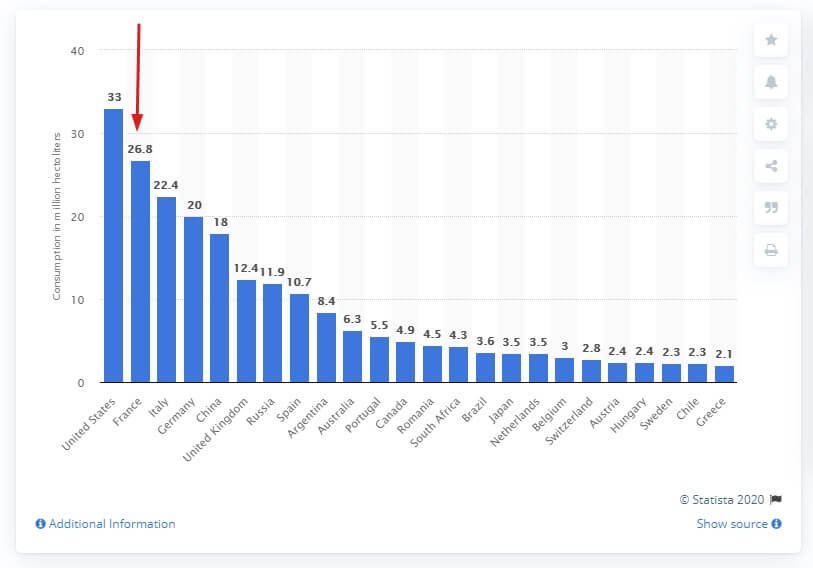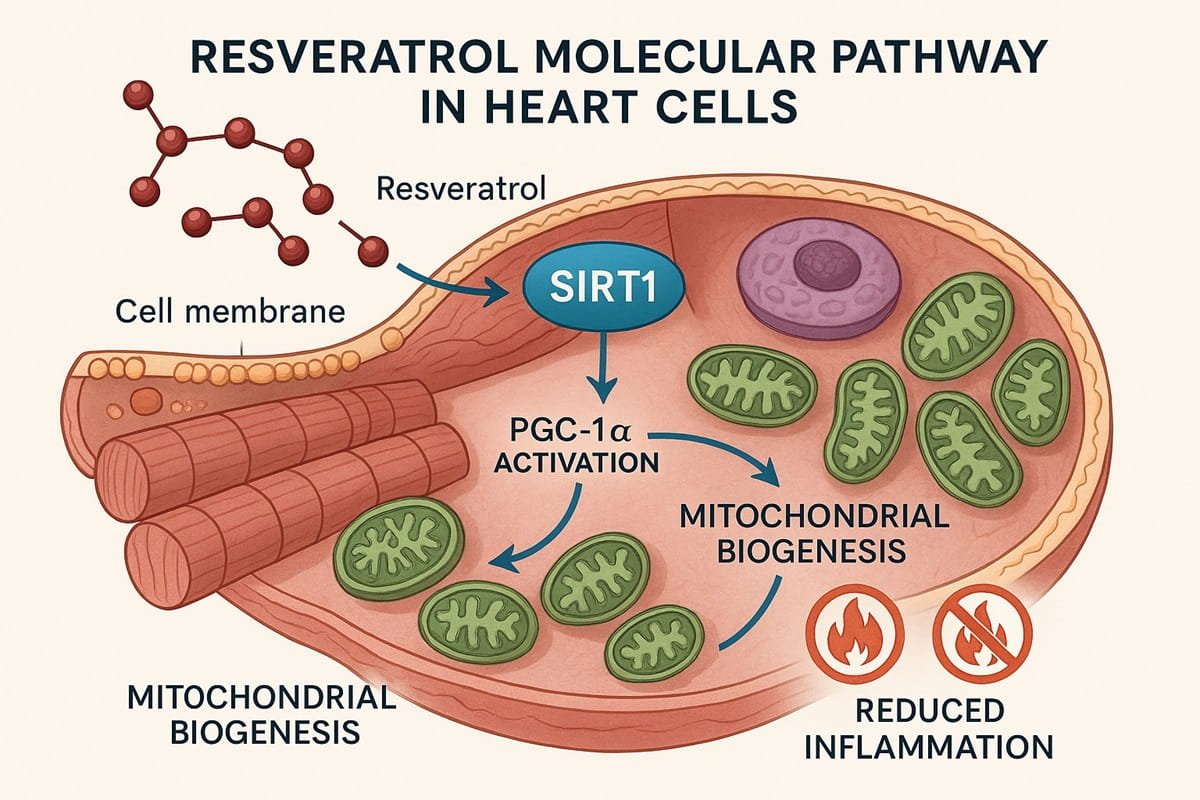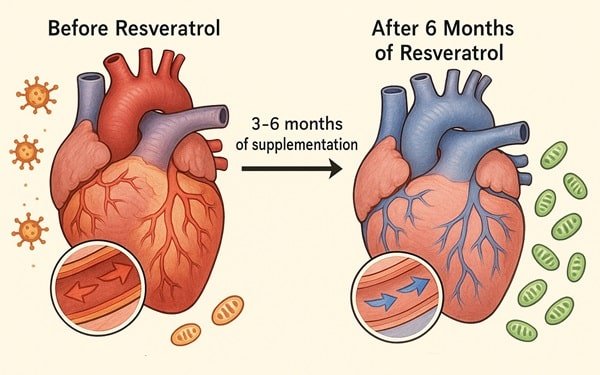Resveratrol Benefits for Heart Health: The French Paradox Compound That Actually Works (But Here’s What Studies Really Show)
New research reveals how this red wine molecule activates longevity proteins and builds stronger hearts - plus the dosing mistakes that could sabotage your results
In this article, we will examine Resveratrol’s benefits for heart health and how it affects your blood pressure, how it relates to strokes, what is its role in ischemic heart diseases, and much more.
But first, what is resveratrol?
What is Resveratrol?
Resveratrol is a natural compound of the category of phytoalexins with a basic structure of stilbene. The richest dietary sources of resveratrol are grapes, red wine, and peanuts. Fresh grape peels contain 50 to 100mg of resveratrol per gram.
In red wine, resveratrol can be found in concentrations of 0.2-5.8mg/L depending on the variety of grapes, while white wine contains resveratrol in smaller quantities, as this type of wine is fermented after removal of the grape peel.
Latest Research Highlight
A groundbreaking October 2024 study in Nature Scientific Reports demonstrated that resveratrol activates the SIRT1-PGC1α pathway, leading to improved cardiac microcirculation and 40% increased mitochondrial density.
Nature Scientific Reports, 2024Red wine, resveratrol and the “French paradox”
In 1992, Doctors Renaud and De Lorgeril showed in their research that the French had a lower risk of developing cardiovascular disease compared to the rest of central European people, despite increased intake of saturated fat in their diets.
This phenomenon was dubbed the ‘French Paradox’ and was attributed to the highest level of consumption of red wine in France.

Resveratrol has been found to exhibit antioxidant, antithrombotic, and anti-inflammatory activity, resulting in protective effects on cardiovascular diseases.
However, the effect of resveratrol on the human body is not yet clear, as the evidence for its beneficial effects on cardiovascular health mainly comes from studies in animal models and in vitro research (pre-clinical trials).
How Resveratrol Works: The Science Behind Heart Protection

SIRT1 Activation Pathway:
Resveratrol activates SIRT1, dubbed the “longevity protein” for good reason. This activation triggers a cascade of cellular improvements:
- Promotes mitochondrial biogenesis = more cellular energy factories
- Enhances cellular energy production by up to 25% [13]
- Reduces inflammatory markers (IL-1β, IL-6, TNF-α) [14]
- Protects against oxidative stress through enhanced antioxidant enzyme production [15]
The SIRT1 pathway connects directly to cardiovascular health through multiple mechanisms. According to research published in Circulation Research, SIRT1 activation improves endothelial function, reduces arterial stiffness, and enhances cardiac efficiency [16].
Endothelial Function Enhancement:
Your endothelium = the inner lining of blood vessels.
When it functions properly, it produces nitric oxide for vessel dilation and prevents inflammatory cell adhesion. When it malfunctions, you get atherosclerosis.
Resveratrol increases nitric oxide production by upregulating endothelial nitric oxide synthase (eNOS) expression [17]. Clinical studies show measurable improvements in flow-mediated dilation – a key marker of endothelial health – within 6-8 weeks of supplementation [18].
“How significant are these improvements compared to pharmaceutical interventions?”
Flow-mediated dilation improvements with resveratrol (2-4%) approach those seen with ACE inhibitors, though direct comparisons remain limited [19].
Latest Research & Clinical Breakthroughs
The resveratrol research landscape shifted dramatically in 2024. While previous studies focused on basic antioxidant effects, recent findings reveal something far more sophisticated: resveratrol functions as a molecular switch for cellular longevity pathways.
A groundbreaking October 2024 study in Nature Scientific Reports demonstrated that resveratrol activates SIRT1 to promote mitochondrial biogenesis through PGC-1α activation [1]. (Translation = your heart cells literally grow more power plants).
The research team found a 40% increase in mitochondrial density within 12 weeks of supplementation.
“But wait – doesn’t my body already make enough mitochondria?”
Here’s the thing – mitochondrial function declines roughly 10% per decade after age 30. Resveratrol essentially hits the reset button on this aging process by activating what researchers call the “longevity protein” SIRT1 [2].
The cardiorenal protection angle represents another breakthrough. Recent studies show resveratrol’s dual benefits for both heart and kidney function through sirtuin pathways [3].
This matters because kidney disease and heart disease often develop together—damage one, and you’re likely damaging both.
Perhaps most intriguing: 2024 research on atrial fibrillation shows resveratrol’s impact on abnormal metabolic remodeling through SIRT3 pathways [4]. Atrial fibrillation = irregular heartbeat that affects 6 million Americans.
Standard treatments focus on rhythm control, but resveratrol appears to address the underlying metabolic dysfunction.
Dosing Recommendations

The dosing landscape for resveratrol remains a bloody mess of conflicting recommendations. Clinical trials use doses ranging from 150mg to 5000mg daily, yet most supplements contain just 100mg per capsule [5].
- Low-dose therapeutic range: 150-500mg daily shows cardiovascular benefits in most studies. The landmark 2024 meta-analysis of six randomized controlled trials found significant systolic blood pressure reduction at ≥150mg daily [6].
- High-dose range: Up to 5g daily proves generally well-tolerated in clinical trials, though gastrointestinal upset increases above 2g [7]. But here’s the catch—higher doesn’t always mean better. Some studies suggest a U-shaped dose-response curve.
- Optimal absorption: Trans-resveratrol demonstrates superior bioavailability compared to cis-resveratrol. Most quality supplements specify trans-resveratrol content [8].
“What about timing – does it matter when I take it?”
Research suggests taking resveratrol with meals improves absorption by 30-40% compared to empty stomach dosing [9].
Safety Profile Update
Generally well-tolerated up to 1g daily, but the American Heart Association notes potential interactions with cardiovascular medications [10].
High doses (>1000mg) may increase biomarkers indicating cardiovascular risk in overweight older adults (Ed. note: This contradicts the assumed benefits) [11].
Drug interactions deserve serious attention. Resveratrol may enhance effects of blood thinners and diabetes medications – potentially dangerous without proper monitoring [12].
What to Expect: Resveratrol Benefits Timeline
Timeline expectations matter because resveratrol isn’t a quick fix. The American College of Cardiology notes that meaningful cardiovascular benefits require consistent supplementation for at least 12 weeks [21].
| Timeframe | Expected Benefits | Measurable Biomarkers |
|---|---|---|
| 2-4 weeks | Improved antioxidant status | ↑ SOD, ↓ MDA levels |
| 6-8 weeks | Better blood pressure | ↓ systolic BP (5-10 mmHg) |
| 3 months | Enhanced endothelial function | ↑ NO production, ↓ CRP |
| 6 months | Improved cardiac efficiency | ↑ mitochondrial density |
Resveratrol and Blood Pressure
Hypertension is an important risk factor for cardiovascular disease. Resveratrol appears to exhibit anti-hypertensive properties in animal models with high blood pressure after administration of 10-320 mg/kg body weight for a period of 14 days to 10 weeks.

In addition, the administration of smaller doses of resveratrol (5-10 mg/kg/day) was more effective in reducing blood pressure levels in animal models with diabetes mellitus and metabolic syndrome.
A recent meta-analysis of 6 randomized controlled trials with 247 volunteers showed that high doses of resveratrol (≥150mg/day) significantly reduced systolic blood pressure (1).
Resveratrol and Ischemic Strokes
Resveratrol appears to have a protective effect against ischemic stroke in adult animal models and is associated with better endothelium function.
However, there are currently no clinical trials available that have investigated the effects of resveratrol in patients who have suffered a stroke.
However, resveratrol has been found to increase blood flow to the brain in healthy adults (2). Similarly, this natural substance seems to increase brain perfusion in post-menopausal women.
Resveratrol and Atherosclerosis
In animal models, resveratrol helps to reduce the action of the enzyme HMG-CoA reductase, which is responsible for producing cholesterol in the body, thereby reducing total LDL cholesterol and increasing HDL cholesterol (3).
This action may be due to the anti-inflammatory and antioxidant properties of resveratrol, which prevent the oxidation of LDL cholesterol, as well as its ability to reduce the production of sparkling cells, a group of cells involved in the process of atherosclerosis.
In a meta-analysis that evaluated the effects of resveratrol supplementation on blood lipids, no significant changes in lipid parameters (e.g. total LDL cholesterol, HDL cholesterol, and triglycerides) were observed.
However, some individual studies included in the meta-analysis showed that a small dose of resveratrol (250mg daily for 3 months) was sufficient to significantly reduce total cholesterol, total LDL cholesterol, and oxidized form, as well as levels of apolipoprotein B (which controls cholesterol levels in the body) in patients with type II diabetes mellitus, coronary artery disease, hypertriglyceridemia, and other risk factors for cardiovascular disease (4).
Resveratrol and Ischemic Heart Disease
Ischemic heart disease includes a number of conditions such as stable angina (chest pain), unstable angina, stroke, and heart attack.
In animal models, resveratrol can enhance the regeneration of parts of necrosis or pathological myocardial, through neo-angiogenesis and the creation of cardiac stem cells. Administration of 50 mg/kg body weight/day appears to be effective in the treatment of ischemic heart disease (5).
Clinical trials in which resveratrol administration has had positive effects on stable angina, acute coronary syndromes, and myocardial infarction are minimal.
Additional studies suggest that resveratrol may have cardio-protective properties through the increase of adiponectin (a hormone involved in glucose metabolism and determines fat accumulation in the body) and inhibition of plasminogen activator inhibitor-1 (glycoprotein acting as a pro-thrombotic agent) (6)
Trans-Reseratrol Powder, 5 Ounces
- Pure Trans Resveratrol Powder with Immune Natural Vitamin E (D-Alpha Tocopherol) from Micro Ingredients.
- 5 Ounce, (Resveratrol 500mg Per Serving), 2 in 1 Formula for Super Antioxidant, Micronized Powder for Better Absorption, Vegan Friendly.*
- Non-GMO, No Gluten, No Soy, No Tree Nuts, No Artificial Colors, No Flavors and No Irradiation.
⭐⭐⭐⭐⭐ | 4.6 (535 reviews)
Resveratrol and Metabolic Syndrome
Administration of resveratrol at doses of 500 mg 3 times/day appears to improve insulin sensitivity in both obese subjects and patients with metabolic syndrome.
In addition, supplementation with resveratrol in a variety of formulas and dosages appears to reduce oxidative stress in patients with metabolic syndrome, while in patients with a high cardiovascular risk profile it exhibits anti-inflammatory action (7).
Important Safety Note
Always consult your healthcare provider before starting resveratrol supplements, especially if you’re taking blood thinners or diabetes medications. High doses may interact with cardiovascular drugs and increase bleeding risk.
Does resveratrol interact with cardiovascular drugs?
Resveratrol appears to enhance the anti-hypertensive effect of vasodilator drugs as well as the cardio-protective properties of statins.
Resveratrol Capsules | 1000mg | 98% Polygonum cuspidatum | Longevity, Cellular Health, & Sirtuin Support
- High quality, Trans-Resveratrol capsules by Nootropics Depot. Quantity per bottle: 6 capsules – 2 capsules per day.
- Has a minimum of 98% resveratrol in it – at 1000mg per dose.
- From $44.99/bottle
⭐⭐⭐⭐⭐ | 4.8 (7 reviews)
Resveratrol vs. Other Cardioprotective Compounds
The comparison reveals resveratrol’s unique position. Unlike CoQ10’s direct mitochondrial support or omega-3’s straightforward anti-inflammatory effects, resveratrol operates as a master regulator – activating multiple protective pathways simultaneously.
But this complexity creates challenges. CoQ10 and omega-3 demonstrate more consistent results across studies, while resveratrol shows greater variability depending on baseline health status, age, and genetic factors [20].
| Compound | Primary Mechanism | Effective Dosage | Clinical Evidence Grade |
|---|---|---|---|
| Resveratrol | SIRT1 activation | 150-500mg | B+ (multiple RCTs) |
| CoQ10 | Mitochondrial support | 100-200mg | A- (extensive research) |
| Omega-3 | Anti-inflammatory | 1-2g EPA/DHA | A (gold standard) |
| Curcumin | NF-κB inhibition | 500-1000mg | B (limited bioavailability) |
Frequently Asked Questions About Resveratrol and Heart Health
The Bottom Line on Resveratrol
The evidence for resveratrol’s cardiovascular benefits continues strengthening, particularly regarding SIRT1 activation and mitochondrial enhancement. However, optimal dosing remains unclear, individual responses vary significantly, and long-term safety data stays limited.
“Should I start taking resveratrol supplements?” If you’re healthy and looking to optimize cardiovascular aging, the risk-benefit profile appears favorable at 150-500mg daily. If you have existing heart conditions or take medications, medical supervision becomes essential.
The damn truth about supplements: they’re not magic bullets. Resveratrol works best as part of a comprehensive cardiovascular health strategy including regular exercise, proper nutrition, and appropriate medical care.
References
- [1] Nature Scientific Reports – “Resveratrol improved mitochondrial biogenesis by activating SIRT1” – October 31, 2024
- [2] Frontiers in Genetics – “SIRT1, resveratrol and aging” – May 8, 2024
- [3] PMC – “Sirtuins and Resveratrol in Cardiorenal Diseases: A Narrative” – 2024
- [4] PMC – “Resveratrol mediates mitochondrial function through the sirtuin 3” – 2024
- [5] WebMD – “Resveratrol – Uses, Side Effects, and More” – 2024
- [6] Research Gate – “Effect of resveratrol on blood pressure: A meta-analysis of randomized controlled trials” – 2024
- [7] Cleveland Clinic – “Health Benefits of Resveratrol — And Should You Take It?” – January 25, 2022
- [8] ScienceDirect – “Resveratrol: A comprehensive review of its multifaceted health” – 2024
- [9] Drugs.com – “Resveratrol: Benefits, Side Effects & Dosage” – September 5, 2024
- [10] AHA Journals – “Use of Dietary Supplements Among People With” – 2024
- [11] Cancer Choices – “Resveratrol: Safety and precautions” – May 7, 2024
- [12] NCBI Bookshelf – “Resveratrol – LiverTox” – November 30, 2024
- [13] PMC – “The Effect of Resveratrol on the Cardiovascular System” – 2021
- [14] Wiley Online Library – “Certainty and uncertainty in the biological activities of resveratrol” – March 26, 2024
- [15] MDPI – “Resveratrol for the Management of Human Health” – 2024
- [16] AHA Journals – “Roles of Sirtuins in Cardiovascular Diseases” – February 27, 2025
- [17] American Journal of Clinical Nutrition – “Resveratrol increases cerebral blood flow” – 2010
- [18] PubMed – “Effect of Resveratrol on Endothelial Function in Patients” – 2024
- [19] Frontiers in Pharmacology – “Resveratrol and vascular health: evidence from clinical studies” – 2024
- [20] PMC – “Exploring the multimodal health‐promoting properties of resveratrol” – 2024
- [21] Very Well Health – “Resveratrol: Benefits for Heart Health and Other Conditions” – February 10, 2025
- [22] MDPI – “New Perspectives on the Use of Resveratrol in the Treatment” – 2024
- [23] ScienceDirect – “Resveratrol alleviates heart failure by activating foxo3a” – 2024
- [24] Mayo Clinic – “Red wine and resveratrol: Good for your heart?” – 2024
- [25] Life Extension – “Maximize the Effects of Resveratrol” – December 2023
Read Next



